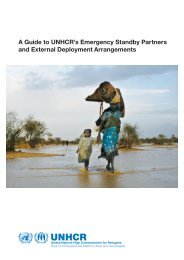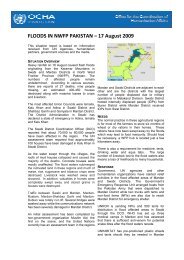Women, Girls, Boys and men - HumanitarianInfo.org
Women, Girls, Boys and men - HumanitarianInfo.org
Women, Girls, Boys and men - HumanitarianInfo.org
You also want an ePaper? Increase the reach of your titles
YUMPU automatically turns print PDFs into web optimized ePapers that Google loves.
Moreover, a balanced team is often more effective at<br />
reaching out to a wider cross-section of the beneficiary<br />
population. For example, in Afghanistan where foreign<br />
males or non-blood relatives could not interact with local<br />
wo<strong>men</strong>, wo<strong>men</strong> working with humanitarian agencies<br />
prActIcAl wAys to hAve A bAlAnceD teAm oF wo<strong>men</strong> AnD <strong>men</strong><br />
• Widely distribute vacancy announce<strong>men</strong>ts to attract a diverse pool of applicants.<br />
• Check that experience <strong>and</strong> education require<strong>men</strong>ts are not too narrowly defined.<br />
I A s c g e n D e r h A n D b o o k<br />
• Where wo<strong>men</strong> or <strong>men</strong> are underrepresented, the vacancy announce<strong>men</strong>t could say “qualified wo<strong>men</strong>/<strong>men</strong> are encouraged to apply.”<br />
• include both wo<strong>men</strong> <strong>and</strong> <strong>men</strong> on interview panels.<br />
• evaluate all c<strong>and</strong>idates against the same criteria.<br />
• do not assume that some jobs are too difficult or dangerous for wo<strong>men</strong>.<br />
• Consider alternative working arrange<strong>men</strong>ts to overcome cultural limitations to wo<strong>men</strong>’s employ<strong>men</strong>t, such as the employ<strong>men</strong>t<br />
of brother/sister teams.<br />
• provide training on gender <strong>and</strong> cultural diversity to all staff.<br />
• offer separate facilities (toilets, sleeping quarters) for wo<strong>men</strong> <strong>and</strong> <strong>men</strong>; provide child care to staff, where possible.<br />
• Keep all staffing data disaggregated by sex for easy monitoring.<br />
WHy doES GEndEr mATTEr<br />
In CrISIS SITuATIonS?<br />
Wars, natural disasters <strong>and</strong> related crisis situations have<br />
profoundly different impacts on wo<strong>men</strong>, girls, boys <strong>and</strong><br />
<strong>men</strong>. They face different risks <strong>and</strong> are thus victimized in<br />
different ways. For example, in the 2005 Tsunami, in parts<br />
of Indonesia <strong>and</strong> Sri Lanka up to 80% of those who died<br />
were wo<strong>men</strong>. In contrast, in situations of armed combat,<br />
young <strong>men</strong> are more often the primary victims.<br />
Here are some other ways of underst<strong>and</strong>ing why gender<br />
issues matter in crisis situations:<br />
1. <strong>Wo<strong>men</strong></strong> <strong>and</strong> <strong>men</strong> respond differently: In efforts to<br />
resist violence, survive <strong>and</strong> support their dependents,<br />
wo<strong>men</strong> <strong>and</strong> <strong>men</strong> act differently. This may be stating the<br />
obvious, but experience to date shows that these gender<br />
aspects of crises are often overlooked <strong>and</strong> invisible when<br />
interventions are planned.<br />
chAngIng genDer roles<br />
<strong>Wo<strong>men</strong></strong> heading households are often unable to access services<br />
because there is no help with child care or support to collect<br />
water or firewood. single male-headed households often have<br />
specific needs as they may not have the skills to cook, to care for<br />
young children or to do household chores.<br />
were able to interact with both Afghan wo<strong>men</strong> <strong>and</strong><br />
male leaders. Gender balance is not only a step towards<br />
attaining equality; it is a critical strategy to build effective<br />
<strong>and</strong> efficient programming.<br />
2. Gender roles change across age <strong>and</strong> over time: Often<br />
assumptions are made based on stereotypical perceptions<br />
of wo<strong>men</strong>’s <strong>and</strong> <strong>men</strong>’s roles. Men are often seen as<br />
perpetrators of violence <strong>and</strong> wo<strong>men</strong> as passive victims.<br />
Yet many young <strong>men</strong> are victimized as they face involuntary<br />
recruit<strong>men</strong>t into armed forces. And in some contexts<br />
wo<strong>men</strong> may be among the principal instigators of<br />
conflict <strong>and</strong> may themselves engage as combatants. In<br />
crisis situations <strong>men</strong> often have great difficulty in dealing<br />
with their changed identities, the loss of their breadwinner<br />
role. As a result they may act out in terms of increased<br />
gender-based violence. <strong>Wo<strong>men</strong></strong>, on the other h<strong>and</strong>, are<br />
often deliberately victimized <strong>and</strong> physically <strong>and</strong> sexually<br />
attacked, but they struggle to regain their sense of dignity<br />
by sustaining their roles as caregivers or taking on new responsibilities.<br />
These changes in “gender roles” can create<br />
significant tensions between wo<strong>men</strong> <strong>and</strong> <strong>men</strong> when the<br />
crisis subsides or settles into a camp routine.<br />
3. Power dynamics change: Effective humanitarian interventions<br />
must not only consider the different needs<br />
<strong>and</strong> capacities of wo<strong>men</strong> <strong>and</strong> <strong>men</strong>. Equally important<br />
are the power relations that affect their respective abilities<br />
to access support. Often wo<strong>men</strong> take on new roles or<br />
step into the vacuum left by <strong>men</strong>. Men may not be able<br />
to play their traditional role as wage-earner or provider.<br />
They may be humiliated by not being able to protect their<br />
family from harm. Humanitarian actors must take these<br />
T H e b A S I C S o n G e n d e R I n e m e R G e n C I e S<br />
BASicS











